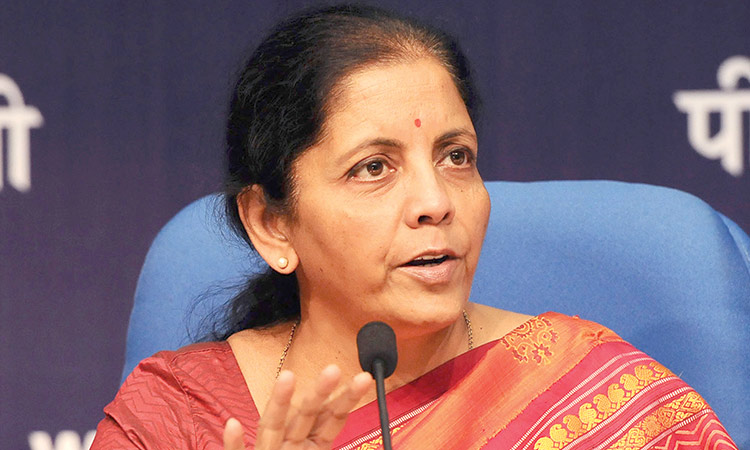India’s GDP set to grow 8% in Q1: Minister

Nirmala Sitharaman. File
The economy is expected to show the same rate of year-on-year expansion for the 2023/24 financial year, Sitharaman added, citing the impact of improved inflation management and macroeconomic stability.
“Hopefully the fourth quarter ... will also have (growth) of 8% or above 8% resulting in 2023/24 having an average growth in GDP of 8% or over 8%,” Sitharaman said during an event in the financial hub of Mumbai.
India’s GDP data for the Jan-March quarter is due to be released on May 31.
Asia’s third-largest economy grew 8.4% in the October-December quarter year-on-year, outpacing the 7.6% growth recorded for the previous quarter.
India’s economy is projected to grow at 7.6% in the current fiscal year to March 31, according to the latest government estimates.
India’s economy grew at its fastest pace in one-and-half years in the final three months of 2023, led by strong manufacturing and construction activity.
Asia’s third largest economy grew 8.4% in the October-December quarter, much faster than the 6.6% estimated by economists polled by Reuters and higher than the 7.6% recorded in the previous three months.
India has consistently beat market expectations and is ranked as one of the fastest-growing economies in the world, with China struggling to recover after the pandemic and the euro zone narrowly escaping a recession.
India revised its growth estimate for the current fiscal year to March 31 to 7.6% from 7.3%.
Such a strong showing in the last major economic data release before elections due by May could bolster Modi’s chances after he made high economic growth one of his main platforms at rallies across the country.
India’s blue-chip Nifty 50 index surged nearly 29% this financial year, ending March 31, powered by a booming economy and strong fund inflows that helped mark the best year for domestic stocks since a post-COVID bounce in fiscal 2021. Aided by the rally in domestic equities, the overall market capitalisation of all National Stock Exchange (NSE) -listed stocks jumped $1.5 trillion, or about 49%, over the last twelve months, to a near record high of $4.56 trillion.
India’s growth has also outpaced its Asian peers, with the domestic economy speeding towards growth of 7.6% in fiscal 2024, the fastest among large economies. India’s stock benchmarks were among the best performing indexes globally in fiscal 2024, only outperformed by the Nasdaq (.IXIC)
The Nifty also recorded its biggest rise in fiscal 2024 since 2021 when record high foreign inflows powered a 71% rise from COVID-19 led lows. Previously, the biggest gain for the index was in fiscal 2010 when stocks rebounded from a drop post the global financial crisis.
Resilience of stock market: The resilience of the Indian stock market and the improving macros of the Indian economy forced the foreign portfolio investors (FPIs) to turn buyers in India, says V K Vijayakumar, Chief Investment Strategist, Geojit Financial Services.
The distinct trend in FPI flows this year is the erratic nature of equity flows in contrast to the steady positive trend in debt inflows.
The year began with equity outflows of Rs 25,743 crore in January which turned into a mild positive inflow of Rs 1538 crore in February and a sharp spurt to Rs 35,098 crore inflows in March, he said.
FPIs were big buyers in capital goods, automobiles, financials, telecom and real estate. They were sellers in IT. FPI inflow into debt has been steady this year and has reached an impressive figure of Rs 55,857 crore in 2024 so far, he added.
Alok Agarwal, Head Quant & Portfolio Manager, Alchemy Capital Management, said Foreign Portfolio Investment (FPI) holdings in the Indian market has dropped to a decadal low of 16.6 per cent in 2023, largely due to a selloff triggered by portfolio underperformance and a spike in US bond yields. Despite the drop, FPI inflows in FY24 remained robust, indicating continued foreign investor confidence in the Indian market.
Additionally, the emergence of retail investors in the Indian stock market has played a crucial role in counterbalancing the impact of FPI outflows, with domestic mutual funds and direct retail investors significantly increasing their free float ownership of NSE listed companies, thereby reducing the influence of FPI flows, he said.







